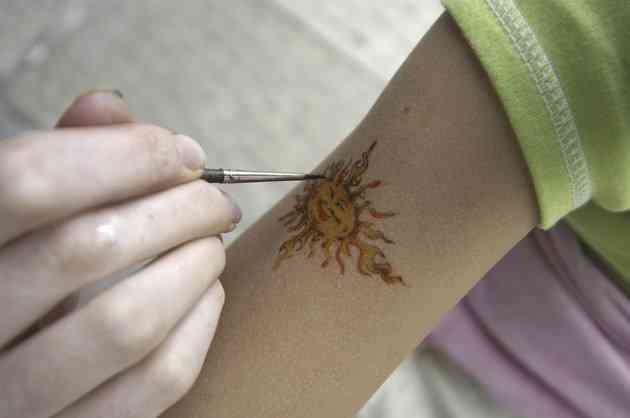The Health Risks of Temporary Tattoos for Children

Not too long ago, parents would have been shocked to see a tattoo on a child, even if it was only temporary. Changing perceptions have made the body adornment more acceptable for kids of all ages, but parents should be wary of what they're getting at the carnival or from street vendors.
 A close up of a child receiving a temporary tattoo. (Image: Purestock/Purestock/Getty Images)
A close up of a child receiving a temporary tattoo. (Image: Purestock/Purestock/Getty Images)Decals
Temporary tattoo decals, usually applied with water, contain color dyes that are approved by the U.S. Food and Drug Administration, (FDA) as cosmetics, meaning the agency has tested them and found them to be safe for direct dermal contact. The FDA has received reports of minor skin irritation including redness and swelling, but the cases are child specific and have resulted in no warnings to the general public. The FDA has in the past issued import blocks on products that do not comply with federal labeling laws, so check to see that the temporary tattoos you buy for your child clearly list the ingredients to be safe.
Vegetable Henna
Vegetable henna is considered generally safe, though contact allergies may occur depending upon your child's sensitivity. Note the color of the ink before you allow your child to try a temporary tattoo. Pure vegetable henna is brown or reddish brown. If it is any other color including blue or black, the mix contains additives that may be harmful to the skin. Ask the tattoo artist for the ingredients of their brand of henna before letting your child get a tribal armband.
Black Henna
Black henna usually contains p-phenylenediamine, or PPD, which is approved by the FDA only for hair dyes. The FDA explicitly forbids the use of PPD in cosmetics, including temporary tattoo dye marketed as “Black Henna.” PPD can cause skin irritations ranging from redness to swelling in mild cases. More severe reactions can lead to altered skin pigmentation and permanent scarring. The PPD in hair dye is already controversial as there is a tested but tenuous link to various cancers. The color additive is aggressively mutagenic according to Ames testing, meaning it is a possible carcinogen that can cause DNA damage.
Applicators
Some temporary tattoo artists use microinjection machines that inject ink, usually henna-based, into the surface layers of the skin using a tiny needle. Unlike deeply injected permanent tattoos, the temporary surface injections fade in a few weeks. The process doesn't hurt, but it does puncture the skin which led the U.K.'s Health and Safety Executive to issue a warning that improperly cleaned machines could lead to the spread of infectious diseases including HIV and hepatitis. The U.K. study led to the banning of several types of machines with internal parts that could carry contamination from one customer to another.




